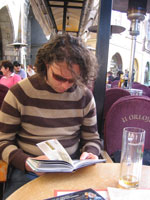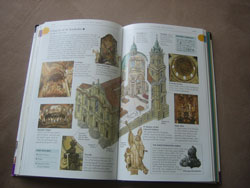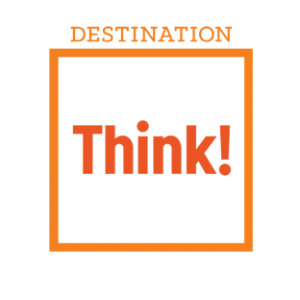Based on own Easter European trip planning experience while I was there, mobile devices are changing everything, guidebooks are still king, visitor centres your best friend, and hotel concierges a valuable resource (even if you don’t stay at their hotel).

As I previously posted, planning our itinerary for our month long European vacation was complicated, but I managed to nail down the dates, flights and accommodation. Most of the details, we worked out during our trip.
Communication with friends and family is always an important part of travel. I remember as a kid that once during our family vacation, my Mom got to call her sister once every trip. We had to look for a place where you could make an international phone call and while my Mom was getting updates about the dog, my Dad would be pacing around, looking at his watch and wondering how much this was going to cost him. Things have changed.
Internet Cafes are everywhere and they’re packed. People use the internet to email, IM, blog, post on their MySpace or Facebook, social travel networks and other ways more to communicate with their loved ones (and anonymous blog visitors). I’m part of this crowd. But this trip was the first time that my Blackberry took over. I was emailing, using my Gmail client, IM-ing and posting on my blog, including pictures. I only went to an internet café a few times. On previous trips, finding the internet café was the first thing This time, there was less need.
My blackberry was also my itinerary keeper. All my confirmations for accommodation and flights were stored and I used it to communicate with accommodation when I realized night trains arrive brutally early. I managed to get an early check-in every time via email. And I used the Google Maps client to find the exact location of accommodation, attractions and restaurants.
For planning our day-to-day activities, I brought my Rick Steve’s guide to Eastern Europe guidebook, I also bought an Eyewitness guidebook for Prague, and my sister gave me a Lonely Planet guide for Budapest. I also downloaded a few podcasts on my iPod.

Rick’s guidebook, proven to be very useful at home while planning my itinerary, became useless during my trip. Because it covers so many places, information about things to do and see became to generic. The long tail of guidebooks.

My Lonely Planet for Budapest was perfect, it was well written, provided more then enough information about the highlights, guided tours and special interest. But it was thin, probably so it’s easy to carry. So again, only the “head” of information was provided. But this is where the Blackberry came in. I was looking up all kinds of stuff on the internet for more information, in particular on Wikipedia. The guidebook provided an easy way to plan our day and the internet provided details on the spot.

In Prague, we had an Eyewitness guidebook. I was very excited about it because it looks so pretty. Colorful pages, with a lot of pictures, 3D overviews of buildings, pictorial maps of squares and more. But I quickly realized that the look and feel got in the way of content. There was hardly any room for information. If I’m standing and looking at the real thing, I don’t need a pictorial of the thing I’m looking at with a one sentence overview, I need more words. So I bought another Lonely Planet for the proven Lonely Planet/Blackberry combo.
In Salzburg, Ljubljana and Krakow, I had to rely on Steve and even though the book provided decent information, I felt like I missed out. In Salzburg, the front desk of the hotel had a tear-off map of Salzburg, with the main sights and attractions numbered. So we started at #1 and work our way down. On the map was an ad for a phone audio tours. Phone a number, press the number on the map and receive a guided tour. Brilliant.
When I got stuck a couple of times (Google maps didn’t work in Ljubljana and we couldn’t figure out the bus in Krakow), we went to the local Visitor Centres. I think it’s universal that people who work in Visitor Centres are the nicest people in town. In most cases, they treat you like family.
I also use hotels all the time when I travel, even when I don’t stay there. Most of their staff members are trained customer service professionals with a passion of assisting travelers. So if your request isn’t too insane, they’ll often help you. So we’ve checked our bags at hotels, used them to call taxis, asked for direction (one woman from the Marriot walked us around for 10 minutes when we were lost), and got some band aids when Sheri had a blister.
I also downloaded some podcasts. I had a Budapest podcast from Frommers, and iPod Traveler. I didn’t like them at all. The Frommers podcast was an interview with the editor of their Hungary book and didn’t do more than stating the obvious and iPod Traveler was painful to listen to. I stopped midway through. The first 10 minutes were wasted by talking about their website and trying to be funny. Then they started arguing about facts. Those are 15 minutes of my life I’ll never get back.

